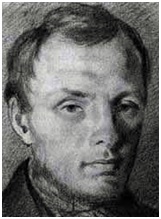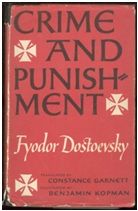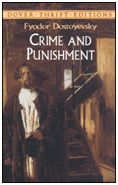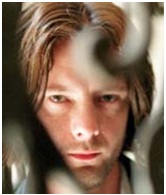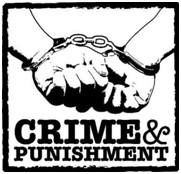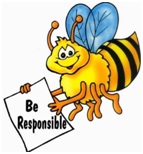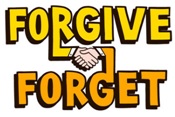|
 |
|
 |
|
|
||
Crime and Punishment - Happiness and Ethics
Crime and Punishment (1867)
Written by the Russian, Fyodor Dostoyevsky (1821-81), pictured right.
Fun facts
Key characters Raskolnikov, poor ex-student. Sonya, his girlfriend. Dunya, his sister. Razumikhin, his friend. Marmeladov, Sonya’s father. Svidrigailov, Dunya’s ex-employer. Porfiry Petrovich, police detective.
The story Raskolnikov, a poor ex-student living in St Petersburg, despises an old, repulsive pawnbroker, Alyona Ivanovna, for cheating poor people like him. So he kills her and (unintentionally) her nice sister, Lizaveta, who arrives unexpectedly. Guilt ridden, he becomes ill and is looked after by his old friend, Razumikhin. Raskolnikov meets a drunk, Marmeladov, who is killed in an accident, and his daughter, Sonya (forced into prostitution to support her family). He gives them all his money to pay for the funeral. Raskolnikov is fiercely opposed to his sister, Dunya’s engagement to a horrible government official, Luzhin. But she ends the relationship. Her lecherous ex-employer, Svidrigailov, and Rasumikhin are in love with her. Suspected and interrogated by the police detective, Porfiry Petrovich, Raskolnikov confesses the murder to Sonya who tries to persuade him to give himself up. Sonya's mother dies and Svidrigailov offers to support the family. Svidrigailov (now engaged to a 16-year-old girl) threatens to rape Dunya after she refuses to marry him. She attempts to shoot him. He then kills himself, giving substantial sums to Dunya and his fiancée’s family. Both Sonya and Petrovich tell Raskolnikov that he can find salvation and peace, if he confesses to the police, which he does. He is sentenced to eight years hard labour in Siberia. His attitude in prison changes from self-centredness to humble contrition. He is transformed by his love for Sonya, who visits him regularly. On his release, they marry, as do Razumikhin and Dunya.
What does it tell us about happiness and ethics? 1. Crime doesn’t pay Raskolnikov (John Simm, pictured right in the BBC adaptation) is tormented by guilt after the murders, but finds peace in love (like Razumikhin, his friend) .
2. Confession is cool Raskolnikov’s guilt is eased by confession. So Sonya gives him a cross to wear, symbolizing Jesus’s message of:
3. Life is sacred Raskolnikov justifies the murder of Alyona, the pawnbroker, on utilitarian grounds In other words, it will make people happier, because she can no longer harm the poor she cheats. But he learns that murder is never justified, however bad a person is.
4. One wrong may lead to another Alyona’s murder results in the killing of her nice sister, Lizaveta, who is Sonya's friend. 5. Love liberates Raskolnikov’s unhappiness leading up to the murder is caused by his self-centredness. His preoccupation with his own problems and the injustices of society blind him to his need for love and support. Marmeladov defines hopelessness as “when one has no one, nowhere else one can go” Raskolnikov only finds true happiness with Sonya who shows how satisfying selfless giving can be.
6. There is good and bad in everyone Raskolnikov has a split personality, torn between good and evil. 7. Morals matter Raskolnikov is handsome and intelligent, but his evil murders nearly destroy him. He finds happiness by:
8. See yourself as others see you Raskolnikov would have been a better person, if he had done something about the weaknesses that other people saw in him.
9. Pleasure through pain Raskolnikov, Sonya and Dunya all face difficulties, but their triumph over them makes them happier and better people. Dostoyevsky once said that the idea behind the book was: “Happiness is bought with suffering”. 10. Forgive and forget Sonya forgives Raskolnikov, even though he has killed her friend, Lizaveta.
Key quote on success Power is only given to him who dares to stoop and seize it ... one must have the courage to dare, Raskolnikov. Taking a new step, uttering a new word, is what people fear most, Raskolnikov. All is in a man's hands and he lets it all slip from cowardice, Raskolnikov.
Key quotes on stress and pain Pain and suffering are always inevitable for a large intelligence and a deep heart. The really great men must, I think, have great sadness on earth, Raskolnikov Do you understand, Sir, what it means when you have absolutely nowhere to turn?, Marmeladov. Accept suffering and achieve atonement through it, Sonya
Key quote on happiness If he has a conscience he will suffer for his mistake. That will be punishment - as well as the prison. Razumikhin.
Key quotes on communication Nothing in this world is harder than speaking the truth, nothing easier than flattery,Svidrigailov Talking nonsense is man’s only privilege that distinguishes him from all other organisms.
Key quote on ethics To go wrong in one's own way is better than to go right in someone else's, Razumikhin What if man is not really a scoundrel. . .then all the rest is prejudice, Raskolnikov.
Two literature websites to recommend 1. sparknotes.com 2. litcharts.com |
|
|
||
|
|
||
| Copyright © wisdomtowin.com 2025 All Rights Reserved | ||
|


